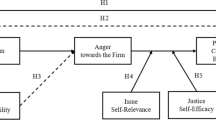Abstract
Retributivism is generally thought to forbid the punishment of the innocent, even if such punishment would produce otherwise good results, such as deterrence. It has recently been argued that because capital punishment always entails the risk of executing an innocent person, instituting capital punishment is tantamount to intentionally taking innocent lives and therefore cannot be justified on retributive grounds. I argue that there are several versions of retributivism, only one of which might categorically forbid risking punishing innocent persons. I also argue that our moral practices reveal either that we do not hold this particular version of retributivism, or that we reject equating risking punishing the innocent with intentionally doing so. *** DIRECT SUPPORT *** A9102008 00005
Similar content being viewed by others
Author information
Authors and Affiliations
Rights and permissions
About this article
Cite this article
Alexander, L. Retributivism and the inadvertent punishment of the innocent. Law Philos 2, 233–246 (1983). https://doi.org/10.1007/BF00144449
Issue Date:
DOI: https://doi.org/10.1007/BF00144449




